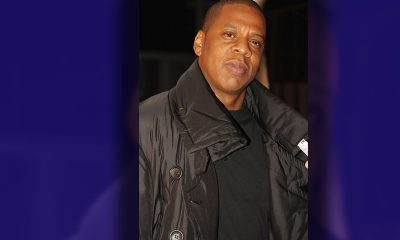National
Rape’s Other Victims

Tiffany Perry, a child of rape, says that there are no services targeted to people conceived through sexual assault. (Photo by Tiffany Perry)
By Jazelle Hunt
NNPA Washington Correspondent
SECOND IN A SERIES
WASHINGTON (NNPA) – The first time Tiffany Perry learned about her conception, she was too innocent to fully understand the gentle explanation her mother was offering, too young to process such a heavy and complicated behavior.
What she distinctly remembers is watching “Oprah” with her mom a few years later, as a 10-year-old. It was the television episode in which Oprah revealed to the world that she was a rape survivor.
“When [Oprah] said herself, and started crying…my mom just fell apart,” the 39-year-old Jersey City, N.J. native recounted. “I tried to console her, but she was inconsolable. It was just so intense.”
At 15 years old, Perry’s mother was raped by her foster mother’s 21-year-old married son. His wife had invited Perry’s mother into their home to babysit their child and to escape her foster mother’s wrath.
Her foster brother raped her repeatedly for two weeks, sometimes at knifepoint. Despite being a virgin at the time and under the care of the state, few people bothered to inquire about the details of the pregnancy. Plus, the fact that he had threatened to kill her, kept Perry’s mother silent.
“Maybe, as a Black person, they just saw this as another teenage pregnancy, and nobody really asked any questions,” Perry said, trying to explain the unexplainable. “I can’t say with certainty…but I’m thinking that if she was White in a foster home and her belly started to grow, then maybe a flag would’ve went up somewhere and somebody would’ve investigated more as to why this foster child is pregnant.”
In subsequent years, freed by the Oprah episode, Perry’s mother became more forthcoming.
“As I grew up, she told me more details of the attack. It was like she had been carrying this around the whole time.”
But opening that door triggered another set of emotions in Perry.
“I went through different feelings of inadequacy, feeling like I had to overcompensate because I was a child of a rape. Even now, when I say the word ‘inadequate,’ I get choked up,” she said, her voice trembling with emotion.
“My mom was awesome, she never talked down to me….my mom always praised me, always gave me love,” Perry said. “But I felt like…I owed it to her to be perfect so she doesn’t feel like keeping me was a mistake.”
And there was the question of what she would say when asked about her father. Perry chose to say that he was dead, that he had left, or that she didn’t know him, depending on the questioner. But even while denying his existence, there was also a deep craving to know about this man, wherever he was.
Wanted to know her roots
More than anything else, she did not want her mother to feel badly.
“I didn’t rape her, but when I was younger, I used to feel like it was my fault,” she recalled. “The dreams that she probably could have fulfilled – if she had stayed that innocent virgin who wanted to be a lawyer – she wasn’t going to be able to fulfill those because I was here.”
Instead of pursuing her dreams, Perry’s mother had to shift her focus, looking after the needs of an infant rather than look forward to a career as an attorney.
“Sometimes she was a little more paranoid than I would think is regular,” Perry said. “When I was growing up my mom was so strict, or smothering, when it came down to me, particularly.”
Once, her mother sent her to the corner store for a few items. There, she ran into a family friend, an older man. He offered to buy her something – she chose cookies – and they parted ways.
She thought nothing of it – until her mother went into a rage.
“She flew off the handle. She beat me with an extension cord. And she told me, ‘Don’t ever accept anything from a man, they can’t be trusted, you don’t know their intentions.’ I’m six. I don’t have a clue what she is talking about.
“She cried. When I got older and reminded her about the incident, she explained to me that she didn’t trust anybody, she didn’t trust any man. And she wanted me to be extra careful. She wanted to put that fear in me.”
It instilled both fear and confusion, blurring the lines of what was acceptable with the boys and men in her world.
“It’s just assumed whenever a woman gets raped, she never gets pregnant, or if she does get pregnant, the child is automatically aborted or adopted,” she said. “There’s this group of people who’ve been conceived by rape and nobody ever discusses us. I want to talk about it because we exist. I exist.”
Unresolved trauma
Philadelphia-based author, activist, and scholar Ewuare Osayande wasn’t born of this violence, but also grew up in its shadow.
His mother spent her childhood at the mercy of a sexually abusive stepfather. The oldest of eight children, she was the only one who was not his blood-relative. The abuse was the family’s open secret. She grew up to date, marry, and divorce abusive men.
Justice Department data show that Black women are more likely than their White counterparts to be assaulted, sexually and otherwise by strangers and by family members.
“It was never the case where my mother cowered in the face of her abuse. She didn’t hold her tongue, she always spoke her mind,” Osayande said.
Today, Osayande is the creator of Project ONUS: Redefining Black Manhood, a series of anti-sexist workshops for Black men. It took time and life experiences before he was able to connect the dots and realize how his mother’s abuse – some he had witnessed, some he had not – had affected his own development.
“That processing has been life-long,” he explained. “I’m a divorcée. In that relationship, I found myself becoming like the men I swore for years I would never be. It never got to the point where I became physically abusive, but certainly emotionally abusive.”
As the son of a rape and abuse survivor, and as a formerly abusive person, he also realized he had to address his own internal conflicts and beliefs.
“It’s been a very real, clear determination on my part to make sense of the life I’ve experienced as a Black man, in a gendered way,” he explained. “It’s been my desire to become an effective ally in that struggle, in that engagement in the world in which Black women exist, and experience.”
Secondary survivors need help
In the sea of services for survivors, most resources geared toward family and friends coach them on how to best support the survivor in their life. Although crisis centers and hotlines are equipped to aid and counsel family and friends of survivors, few resources address the challenges these relatives face.
The book, I Will Survive: The African American Guide to Healing from Sexual Assault and Abuse, cites a study that draws parallels between the emotions of boyfriends and husbands of women who have been sexually assaulted, and the wives and girlfriends of war veterans.
“Not surprisingly, past or recent sexual trauma can present unique challenges for the survivor’s partner,” writes Lori Robinson, author of the book. “You are a victim too. Some experts call you the secondary victim. After all you are experiencing many of the same emotions sexual assault victims feel.”
Tiffany Perry’s breaking point came about 20 years ago. A probation officer contacted her out of the blue, looking for her father. He had given her name and birthdate as his next-of-kin. She learned that not only did he know about her, but he knew where she lived. To this day, the two live less than an hour apart. She has never contacted him, but has learned a bit about his life via a cousin and aunt on Facebook.
Perry’s mother remains her primary source of support.
“When I went to go look for support groups for children of rape victims or children conceived out of rape, they’re pretty much nonexistent,” Perry says. “[Rape] is so common we don’t even cringe when we hear about it. Rape is inhumane, and people are not treating it like it’s inhumane. They just treat it like ‘Well, it happens.’”
NEXT WEEK: Should we have faith in the faith community?
PART I: Rape and the myth of the “Strong Black Woman”
(The project was made possible by a grant from the National Health Journalism Fellowship, a program of the University of Southern California Annenberg School for Communication and Journalism.)
###
Activism
Oakland Post: Week of December 24 – 30, 2025
The printed Weekly Edition of the Oakland Post: Week of – December 24 – 30, 2025

To enlarge your view of this issue, use the slider, magnifying glass icon or full page icon in the lower right corner of the browser window.
Activism
Desmond Gumbs — Visionary Founder, Mentor, and Builder of Opportunity
Gumbs’ coaching and leadership journey spans from Bishop O’Dowd High School, Oakland High School, Stellar Prep High School. Over the decades, hundreds of his students have gone on to college, earning academic and athletic scholarships and developing life skills that extend well beyond sports.

Special to the Post
For more than 25 years, Desmond Gumbs has been a cornerstone of Bay Area education and athletics — not simply as a coach, but as a mentor, founder, and architect of opportunity. While recent media narratives have focused narrowly on challenges, they fail to capture the far more important truth: Gumbs’ life’s work has been dedicated to building pathways to college, character, and long-term success for hundreds of young people.
A Career Defined by Impact
Gumbs’ coaching and leadership journey spans from Bishop O’Dowd High School, Oakland High School, Stellar Prep High School. Over the decades, hundreds of his students have gone on to college, earning academic and athletic scholarships and developing life skills that extend well beyond sports.
One of his most enduring contributions is his role as founder of Stellar Prep High School, a non-traditional, mission-driven institution created to serve students who needed additional structure, belief, and opportunity. Through Stellar Prep numerous students have advanced to college — many with scholarships — demonstrating Gumbs’ deep commitment to education as the foundation for athletic and personal success.

NCAA football history was made this year when Head Coach from
Mississippi Valley State, Terrell Buckley and Head Coach Desmond
Gumbs both had starting kickers that were women. This picture was
taken after the game.
A Personal Testament to the Mission: Addison Gumbs
Perhaps no example better reflects Desmond Gumbs’ philosophy than the journey of his son, Addison Gumbs. Addison became an Army All-American, one of the highest honors in high school football — and notably, the last Army All-Americans produced by the Bay Area, alongside Najee Harris.
Both young men went on to compete at the highest levels of college football — Addison Gumbs at the University of Oklahoma, and Najee Harris at the University of Alabama — representing the Bay Area on a national level.
Building Lincoln University Athletics From the Ground Up
In 2021, Gumbs accepted one of the most difficult challenges in college athletics: launching an entire athletics department at Lincoln University in Oakland from scratch. With no established infrastructure, limited facilities, and eventually the loss of key financial aid resources, he nonetheless built opportunities where none existed.
Under his leadership, Lincoln University introduced:
- Football
- Men’s and Women’s Basketball
- Men’s and Women’s Soccer
Operating as an independent program with no capital and no conference safety net, Gumbs was forced to innovate — finding ways to sustain teams, schedule competition, and keep student-athletes enrolled and progressing toward degrees. The work was never about comfort; it was about access.
Voices That Reflect His Impact
Desmond Gumbs’ philosophy has been consistently reflected in his own published words:
- “if you have an idea, you’re 75% there the remaining 25% is actually doing it.”
- “This generation doesn’t respect the title — they respect the person.”
- “Greatness is a habit, not a moment.”
Former players and community members have echoed similar sentiments in public commentary, crediting Gumbs with teaching them leadership, accountability, confidence, and belief in themselves — lessons that outlast any single season.
Context Matters More Than Headlines
Recent articles critical of Lincoln University athletics focus on logistical and financial hardships while ignoring the reality of building a new program with limited resources in one of the most expensive regions in the country. Such narratives are ultimately harmful and incomplete, failing to recognize the courage it takes to create opportunity instead of walking away when conditions are difficult.
The real story is not about early struggles — it is about vision, resilience, and service.
A Legacy That Endures
From founding Stellar PREP High School, to sending hundreds of students to college, to producing elite athletes like Addison Gumbs, to launching Lincoln University athletics, Desmond Gumbs’ legacy is one of belief in young people and relentless commitment to opportunity.
His work cannot be reduced to headlines or records. It lives on in degrees earned, scholarships secured, leaders developed, and futures changed — across the Bay Area and beyond.
Activism
Families Across the U.S. Are Facing an ‘Affordability Crisis,’ Says United Way Bay Area
United Way’s Real Cost Measure data reveals that 27% of Bay Area households – more than 1 in 4 families – cannot afford essentials such as food, housing, childcare, transportation, and healthcare. A family of four needs $136,872 annually to cover these basic necessities, while two adults working full time at minimum wage earn only $69,326.

By Post Staff
A national poll released this week by Marist shows that 61% of Americans say the economy is not working well for them, while 70% report that their local area is not affordable. This marks the highest share of respondents expressing concern since the question was first asked in 2011.
According to United Way Bay Area (UWBA), the data underscores a growing reality in the region: more than 600,000 Bay Area households are working hard yet still cannot afford their basic needs.
Nationally, the Marist Poll found that rising prices are the top economic concern for 45% of Americans, followed by housing costs at 18%. In the Bay Area, however, that equation is reversed. Housing costs are the dominant driver of the affordability crisis.
United Way’s Real Cost Measure data reveals that 27% of Bay Area households – more than 1 in 4 families – cannot afford essentials such as food, housing, childcare, transportation, and healthcare. A family of four needs $136,872 annually to cover these basic necessities, while two adults working full time at minimum wage earn only $69,326.
“The national numbers confirm what we’re seeing every day through our 211 helpline and in communities across the region,” said Keisha Browder, CEO of United Way Bay Area. “People are working hard, but their paychecks simply aren’t keeping pace with the cost of living. This isn’t about individual failure; it’s about policy choices that leave too many of our neighbors one missed paycheck away from crisis.”
The Bay Area’s affordability crisis is particularly defined by extreme housing costs:
- Housing remains the No. 1 reason residents call UWBA’s 211 helpline, accounting for 49% of calls this year.
- Nearly 4 in 10 Bay Area households (35%) spend at least 30% of their income on housing, a level widely considered financially dangerous.
- Forty percent of households with children under age 6 fall below the Real Cost Measure.
- The impact is disproportionate: 49% of Latino households and 41% of Black households struggle to meet basic needs, compared to 15% of white households.
At the national level, the issue of affordability has also become a political flashpoint. In late 2025, President Donald Trump has increasingly referred to “affordability” as a “Democrat hoax” or “con job.” While he previously described himself as the “affordability president,” his recent messaging frames the term as a political tactic used by Democrats to assign blame for high prices.
The president has defended his administration by pointing to predecessors and asserting that prices are declining. However, many Americans remain unconvinced. The Marist Poll shows that 57% of respondents disapprove of Trump’s handling of the economy, while just 36% approve – his lowest approval rating on the issue across both terms in office.
-

 #NNPA BlackPress4 weeks ago
#NNPA BlackPress4 weeks agoLIHEAP Funds Released After Weeks of Delay as States and the District Rush to Protect Households from the Cold
-

 Alameda County3 weeks ago
Alameda County3 weeks agoSeth Curry Makes Impressive Debut with the Golden State Warriors
-

 Activism4 weeks ago
Activism4 weeks agoOakland Post: Week of November 26 – December 2, 2025
-

 #NNPA BlackPress4 weeks ago
#NNPA BlackPress4 weeks agoSeven Steps to Help Your Child Build Meaningful Connections
-

 #NNPA BlackPress4 weeks ago
#NNPA BlackPress4 weeks agoSeven Steps to Help Your Child Build Meaningful Connections
-

 #NNPA BlackPress4 weeks ago
#NNPA BlackPress4 weeks agoTrinidad and Tobago – Prime Minister Confirms U.S. Marines Working on Tobago Radar System
-

 #NNPA BlackPress4 weeks ago
#NNPA BlackPress4 weeks agoThanksgiving Celebrated Across the Tri-State
-

 #NNPA BlackPress4 weeks ago
#NNPA BlackPress4 weeks agoTeens Reject Today’s News as Trump Intensifies His Assault on the Press























































Pingback: Some Faith Leaders Victimize Rape Survivors Again | BlackPressUSA
Pingback: Some Faith Leaders Victimize Rape Survivors Again | BlackPressUSA
Pingback: Rape and the Myth of ‘The Strong Black Woman’ | BlackPressUSA
Pingback: Rape and the Myth of ‘The Strong Black Woman’ | BlackPressUSA